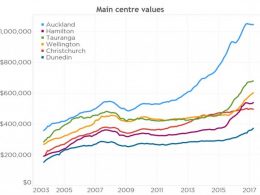My first podcast with mortgage broker, Jenny Cheevers turned out to be a huge success. So we put together this little update where we answer some of your most common questions around finance.
For example:
Do you really need a 20% deposit to buy a home?
How have the new 40% LVR rules for investors affected the market?
Should a first home buyer pay off their student loan? Or keep saving for their deposit?
What’s going to happen to interest rates?
Enter Jenny Cheevers…
To get in touch with Jenny:
Call 027 244 6686
Email jenny@jennycheevers.co.nz
Check her out on facebook
Disclaimer: In the podcast below, and in the transcript that follows, you will read information on financial matters. While all care has been taken in the preparation of this article, no warranty is given as to the accuracy of the information and no responsibility is taken by Mortgage Express Limited or Jenny Cheevers, or Andrew Duncan for any errors or omissions. This article does not constitute personalised financial advice. It may not be relevant to individual circumstances. Nothing in this article is, or should be taken as, an offer, invitation, or recommendation to buy, sell, or retain any investment in or make any deposit with any person. You should seek professional advice before taking any action in relation to the matters dealt within this article. A Disclosure Statement is available on request and free of charge.
Q&A with top Wellington mortgage broker, Jenny Cheevers:
An abbreviated transcript of our catchup follows below…
Intro: As a mortgage broker, what is it that you do?
A: “I help people get mortgage finance so they can buy property. It doesn’t have to be their first home. It can be for an investment property, or just their second or third home. I can help you through the process of buying, and then, of course, that negotiation with the banks once your offer is accepted with things like interest rates and cash contributions.
It’s also about using my knowledge (from 20 years experience) to help you with how you might like to structure your loan and what you might need to know to buy a house if you haven’t done it for a long time, or if it’s all new to you.”
Q: And you’re able to work with a number of different banks to get your clients the best possible deal? The best structure?
A: “The only bank we don’t work with is Kiwibank and we don’t find that to be an issue with our clients. I can also help you negotiate with your own bank.”
Q: The new LVR (Loan to Value Ratio) rules from the reserve bank state investors need to have a 40% deposit when buying an investment property.
How has that affected the market from your point of view?
I think that because of the way property prices are going up it probably hasn’t quite had the impact that they (the reserve bank) were expecting. One of my clients in particular who bought 12 months ago has found the properties he owns have gone up in value so much now that he could leverage the equity to buy more.
I suppose it’s actually the registered valuers who are doing quite well, re-valuing investor’s properties so they can extract more equity. I think moving forward it might slow a little bit if house prices don’t increase as much as they have been. At the moment I’m not seeing a huge impact at all though.”
Q: Do first home buyers really need a 20% deposit? How strict is that rule?
A: It is not a strict rule at all. There is definitely an opportunity for clients to be able to get finance with only a 10% deposit, however, sometimes it just takes a little bit longer. The income servicing test changes so it might make it a little bit more difficult to get approved. Some of the lenders will come out and say ‘we’ve got no money to lend over 80%’ from time to time, but it’s certainly not a no-go zone. I talk with all of my clients about what their situation is, and how we can make something work.
The other misconception I see is this: At the beginning of the year I had a client who thought that because he didn’t have a 20% deposit he had to have a welcome home loan and not all of the lenders do welcome home loans. However, this wasn’t required. A lender would have considered his application as a normal one just like anyone else with a less than 20% deposit.”
Q: If I start a new job, or get a raise. How quickly does that change in my financial circumstances affect my ability to get mortgage finance?
“If you have a pay increase – that is going to take effect (from the bank’s point of view) straight away.
If you have started a new job – If it’s within a similar industry to what you have been in before, a bank will look at taking that as being a proven income straight away. Howver, if you have started a completely new job with a 3 month probation period, the banks may want that 3 month probation period to be up or get a waiver of the probation period before going ahead with any finance approval.
I had a client recently who moved Cities, same occupation, but had a 3 month probation period. The banks were happy enough though as the client was doing a similar line of work as they had been before. It also helps if you have a good deposit though!
It’s often a combination of things that go into securing mortgage finance.”
Q: Say I’m a first home buyer, saving a deposit. Should I focus on paying off my student loan?
Or just stick to the minimum payments and focus on putting all my money into saving as big a house deposit as possible?
A: “Because your student loan is interest-free (if you’re in NZ), making your regular payment that gets deducted automatically from your income is the better way of going about it. Otherwise, you could end up in a situation where you have paid off your student loan, but you have no savings, making it hard to secure finance with the bank. You need some cash in the bank to get approved.”
Q: What’s going to happen with interest rates over the next 6-12 months?
A: “That’s when I reach under the table to grab my crystal ball! In truth, I don’t really know. People could ask the top economist who could have predictions, but they are only predictions. In actual reality, nobody really knows whats going to happen.
I do remember going to a conference where Don Brash was speaking (Governor of reserve bank at the time). He said that his children could ask him ‘what’s going to happen with interest rates’. His response was: “You have to ask yourself how much certainty you want.” At the moment, the longer you fix for, the higher your rate is, but the more certainty you will have about what your repayments will be.
It’s about what’s important to you. That certainty of where you’re going to be, and what your rate is going to be in 3, 4, 5 years time. Or are you happy to make things a little bit risky and float or fix for 1 or 2 years not knowing where interest rates are going to be?
What is your risk appetite? Rates will go up and down. You have to expect that. A number of my clients spread their mortgage over different fixed rate terms. eg. 40% fixed for 1 year. 30% fixed for 3 years. 30% fixed for 5 years. It spreads their risk a little bit.”
In Conclusion…
I have personally used a mortgage broker each time I have bought. Why? They help you get the best possible deal (and improve your chances of getting approved in the first place) as they are there to negotiate on your behalf and present your ‘case’ to the bank in the best possible light. This can really help when negotiating interest rates and lump sum payments up front which some banks are offering right now.
Plus their service is free.
A mortgage broker can also help with advice on how to structure your mortgage (eg. to fix or float) and how to pay it off as quickly as possible.
Jenny Cheevers is one of the best around. You can check her out on facebook here.
Best wishes,
Andrew Duncan – Real Estate Blogger












Very interesting article, I see a lot of useful information
thank you Andrew ! Your blog is very interesting for me
Regards
Tom